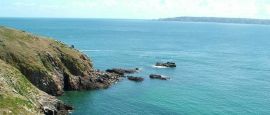Sark & Herm History, Language and Culture
History of Sark & Herm
Swashbuckling pirates, secretive smugglers, daring invasions – the history of Sark and Herm reads more like a book of fairy tales than a plain account of fact.
William the Conqueror annexed both islands to the Duchy of Normandy in 1066 when monks formed the majority of the population, but after the division of Normandy in 1204 the community dwindled. Herm became a hunting ground for the governors of Guernsey and Sark became a raiding base for pirates and smugglers.
Both islands were occupied by the Nazis during WWII and Sark almost suffered a more recent invasion in 1990… from an unemployed nuclear physicist called Andre Gardes. He set out for Sark armed with a semi-automatic weapon and a box of flyers advertising his intention to seize control the next day at noon. The morning before the invasion he was tracked down by Sark’s constable, who complimented his weapon, persuaded him to hand it over and promptly arrested him.
Sark has a fully democratic government – 28 members elected to the parliament, called the Chief Pleas. Its first full elections in 2008 ended the 450-year-old fiefdom and the island’s status as Europe’s last remaining feudal state. However, the feudal lord, the Seigneur (aka John Michael Beaumont, who inherited the title in 1974) remains in a largely ceremonial role.
Herm is owned by the States of Guernsey and leased to a single tenant, on condition that the public has access to its foreshore and other parts of the island.
Did you know?
• Until 2008 the Seigneur was the only person on Sark allowed to keep pigeons, or an unspayed dog.
• Sark has no tax on income, capital gains or inheritance and no VAT on goods and services.
• There is no airport on Sark and it is a car-free zone.




 You know where
You know where